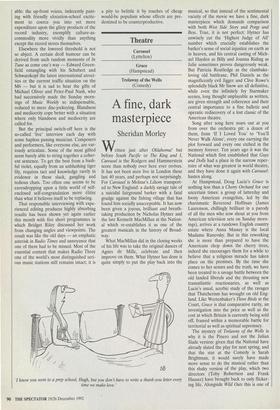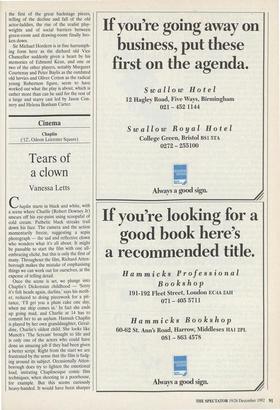Theatre
Carousel (Lyttelton) Grace (Hampstead) Trelawny of the Wells (Comedy)
A fine, dark masterpiece
Sheridan Morley
Written just after Oklahoma! but before South Pacific or The King and I, Carousel is the Rodgers and Hammerstein score than nobody over here ever revives. It has not been seen live in London these last 40 years, and perhaps not surprisingly. For Carousel is Molnar's Liliom transport- ed to New England: a darkly savage tale of a suicidal fairground barker with a fatal grudge against the fishing village that has found him socially unacceptable. It has now been given a joyous, brilliant and breath- taking production by Nicholas Hytner and the late Kenneth MacMillan at the Nation- al which re-establishes it as one of the greatest musicals in the history of Broad- way.
What MacMillan did in the closing weeks of his life was to take the original dances of Agnes de Mille, celebrate and then improve on them. What Hytner has done is quite simply to put the play back into the 'I know you went to a prep school, Hugh, but you don't have to write a thank-you letter every time we make love.' musical, so that instead of the sentimental vacuity of the movie we have a fine, dark masterpiece which demands comparison with both West Side Story and Porgy and Bess. True, it is not perfect: Hytner has unwisely cut the 'Highest Judge of All' number which crucially establishes the barker's sense of social injustice on earth as in heaven, and his central casting of Mich- ael Hayden as Billy and Joanna Riding as Julie sometimes proves dangerously weak. But Patricia Routledge as the clambake- loving old battleaxe, Phil Daniels as the magnificently evil Jigger and Clive Rowe's splendidly black Mr Snow are all definitive, while even the infinitely fey Starmaker scenes, long thought unplayable as written, are given strength and coherence and their central importance to a fine balletic and operatic rediscovery of a lost classic of the American theatre.
Song after song here soars out at you from over the orchestra pit: a dozen of them, from 'If I Loved You' to 'You'll Never Walk Alone', every one carrying the plot forward and every one etched in the memory forever. Ten years ago it was the National which first established that Guys and Dolls had a place in the narrow reper- toire of what was greatest in world theatre, and they have done it again with Carousel: hasten along.
At Hampstead, Doug Lucie's Grace is nothing less than a Cherry Orchard for our uncertain times: a group of latterday and loony American evangelists, led by the charismatic Reverend Hoffman (James Laurenson, chillingly brilliant in a parody of all the men who now shout at you from American television sets on Sunday morn- ings), arrives at a rundown English country estate where Anna Massey is the local Madame Ranevsky. But in this reworking she is more than prepared to have the Americans chop down the cherry trees, indeed she encourages them for a while to believe that a religious miracle has taken place on the premises. By the time she comes to her senses and the truth, we have been treated to a savage battle between the old landed liberals and the thrusting new transatlantic reactionaries, as well as Lucie's usual, acerbic study of the ravages that Thatcherism has wrought on old Eng- land. Like Wertenbaker's Three Birds at the Court, Grace is that comparative rarity, an investigation into the price as well as the cost at which Britain is currently being sold off, framed within a memorable battle for territorial as well as spiritual supremacy.
The mystery of Trelawny of the Wells is why it is the Pinero and not the Julian Slade version: given that the National have already slated the play for next spring, and that the star at the Comedy is Sarah Brightman, it would surely have made more sense to do the musical rather than this shaky version of the play, which two directors (Toby Robertson and Frank Hauser) have brought back to only flicker- ing life. Alongside Wild Oats this is one of the first of the great backstage pieces, telling of the decline and fall of the old actor-laddies, the rise of the realist play- wrights and of social barriers between green-room and drawing-room finally bro- ken down.
Sir Michael Hordern is in fine harrumph- ing form here as the diehard old Vice Chancellor suddenly given a heart by his memories of Edmund Kean, and one or two of the other players, notably Margaret Courtenay and Peter Baylis as the outdated old luvvies and Oliver Cotton as the radical young Robertson figure, seem to have worked out what the play is about, which is rather more than can be said for the rest of a large and starry cast led by Jason Con- nery and Helena Bonham Carter.











































































































 Previous page
Previous page